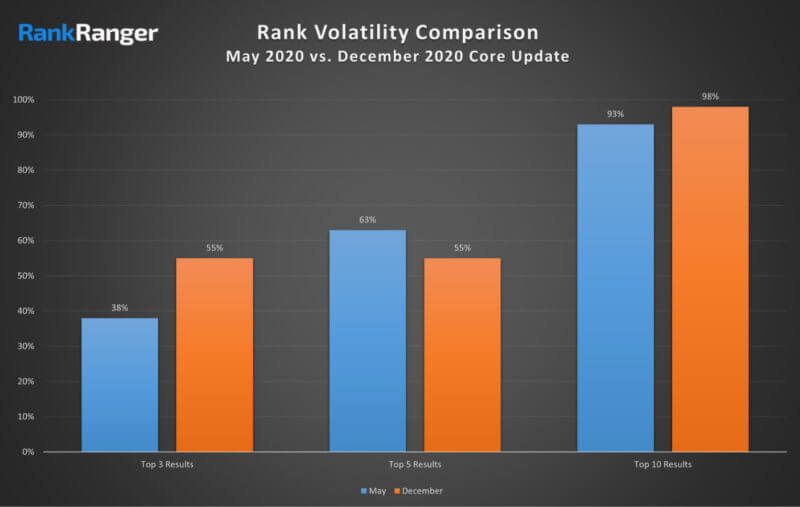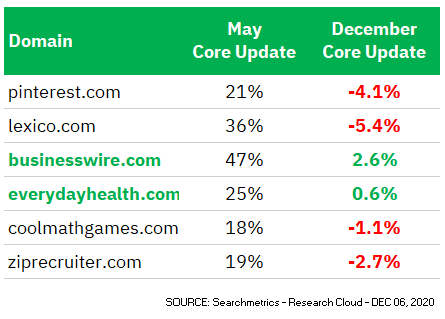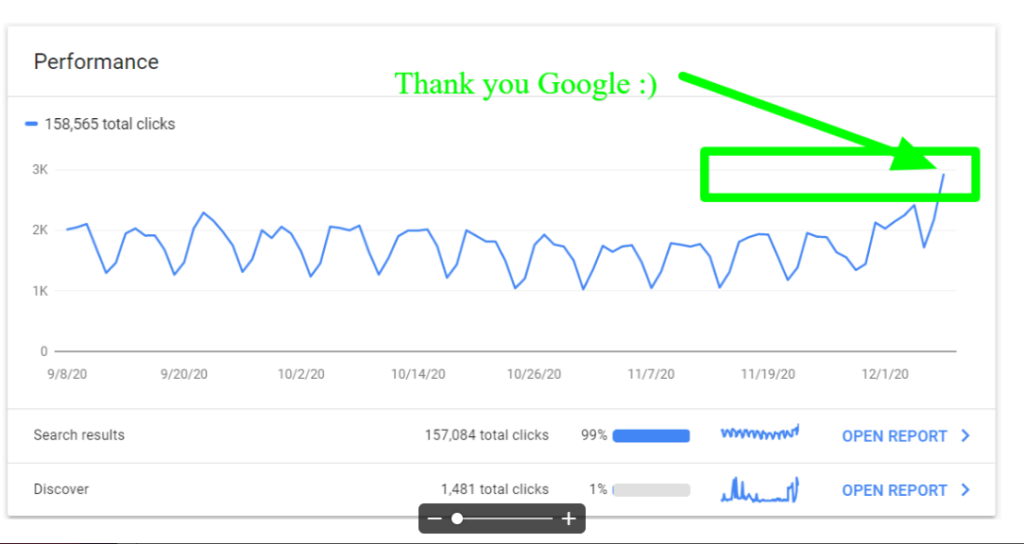In case you missed the news, the rollout of the new update started at 1PM on December 3rd. Here’s the announcement from Google:
Later today, we are releasing a broad core algorithm update, as we do several times per year. It is called the December 2020 Core Update. Our guidance about such updates remains as we’ve covered before.
As you can see from the statement above, Google’s guidance about how you should adjust your SEO habits remains the same as it has every time the company releases an update.
What Guidance?
So what’s the guidance that the Big G routinely dispenses following an algorithm change? It’s reminiscent of Michael Corleone’s famous line in Godfather 2: “My offer is this: nothing.”
Nothing. That’s what Google wants you to do in response to an algorithm change.
Of course, Google puts it a little more diplomatically than that:
[P]ages that drop after a core update don’t have anything wrong to fix. This said, we understand those who do less well after a core update change may still feel they need to do something. We suggest focusing on ensuring you’re offering the best content you can. That’s what our algorithms seek to reward.
But hopefully you were already “focusing on ensuring you’re offering the best content you can” before the update. And if you were, then there’s nothing more you can do.
The Extent of Google Dec 2020 Core Update
The Google Dec 2020 core update is a big one. It looks like it’s even bigger than the last major update that happened in May.
Analysts at RankRanger reported a 98% rank volatility metric for the top 10 results in Google search. That beats the 93% metric for the May update.
Further, RankRanger says that fluctuations in the top twenty positions more than doubled: from 153 in May to 345 this month.

RankRanger: Google Dec 2020 Update Comparison
Within the first page in Google search, the rank volatility is evenly split between industries. Health, retail, travel, and finance all clock in at 97-99% volatility.
SEMRush has a different take on effect-per-industry, though. That company’s research showed the Google Dec 2020 core update most impacted desktop search in the health, real estate, finance, travel, law, and government sectors.
Different story on mobile. That’s where health, government, law, education, and real estate saw the biggest fluctuations.
Additionally, SEMRush shared the domains that won and lost the most following the update.
Winners:
- zoominfo.com
- whitepages.com
- linkedin.com
- ebay.com
- vimeo.com
- loginbrain.com
- yahoo.com
- foursquare.com
- businesswire.com
Losers:
- yellowpages.com
- newsbreak.com
- gettyimages.com
- wish.com
- echovita.com
- urbandictionary.com
- local.com
- dnb.com
- aliexpress.com
Searchmetrics also analyzed the domains most impacted by the May update and how they fared after the Google Dec 2020 core update. Here are the results:
- Spotify lost 15% in rankings in May, but gained just half a percentage point in rankings in December
- Poki lost 40% in May and gained nothing this month
- TheBalance lost 19% in May but gained 12.5% in December
- Twitch lost 28% in May and another 1.7% after the recent update
- Rakuten lost 27% in May but gained back 16.6% of it this month
- Carfax lost 20% in May and gained just 1.4% in December
- CreditKarma lost 33% in May and gained 16.6% this month
Interestingly enough, Searchmetrics also found that Pinterest got hit pretty hard with the recent update. While that site gained significantly in May, it lost about 4% in rankings this month.

Google Dec 2020 Core Update
By the way, if you’re wondering why the data doesn’t perfectly match between analysts, it’s because they’re each tracking different metrics, keywords, and sites. So it’s understandable that their results wouldn’t line up.
How Long Will It Take?
The whole update will probably take a couple of weeks to roll out.
While it’s happening, don’t be surprised if you see your keywords jumping around from day to day in rank. That’s fairly typical as things shake out.
For some of you, though, the results may have already stabilized. In fact, we’re already seeing some positive results at Ignite Visibility.
Let me explain why I think this Google Dec 2020 core update will help us gain more traffic.
Our Recent Changes
Google’s “do nothing” advice won’t help you much. However, Google dishes out plenty of great insight about how to gain rank that’s independent of any algorithm changes.
For starters, earlier this year the company said that it will start using Core Web Vitals as a ranking factor. You’ll see that go into effect in May.
If you’re unfamiliar with Core Web Vitals, they’re a set of user experience metrics. They measure page speed and layout shift.
The better you score with Core Web Vitals, the more likely you’ll get a great rank.
Over the past year, our team at Ignite Visibility prioritized Core Web Vitals on our own website. If you found this page from search, then that’s pretty strong evidence that our efforts have paid off.

Ignite Visibility: Google Dec 2020 Core Update
Specifically, we’ve reduced page load times by more than half. We’re going to see an even bigger benefit from page speed next year when Core Web Vitals officially become a ranking signal.
Also, we’ve optimized and refined our Accelerated Mobile Pages (AMP) tech.
AMP loads pages in a jiffy on mobile platforms. It’s a great way to improve user experience for people who visit our site on a smartphone or tablet.
Also, we always deliver quality content. We’re into digital marketing around these parts so we make sure that our content is helpful and relevant to people looking for answers to questions about SEO, online advertising, email marketing, social media marketing, and other related topics.
We’ve also added some industry studies to our content marketing efforts. That kind of in-depth analysis makes it clear not only to our readers but also to Google that we’re experts in the digital marketing space.
Further, we’ve been on the receiving end of some great PR in 2020. Even with the pandemic, we’ve managed to produce for our clients and land some big wins. And the press noticed.
Finally, we also block bad links every two weeks. If you haven’t yet disavowed linkspam, you should get on that quickly.
Just make sure you get some professional assistance, though. If you’re not absolutely certain about how to disavow bad backlinks, you could end up doing more harm than good.
Wrapping It Up
Say hello to another Google algorithm change. Have you noticed how it affected your site?
If your keywords are still doing the Google Tango, just let things play out for a few more days before trying to analyze how the algorithm helped our hurt your rankings.
In the meantime, don’t react to the update. Instead, look to the future.
Make sure your site is ready for when Core Web Vitals become a ranking signal. That’s how you’ll stay at the top of the search results.